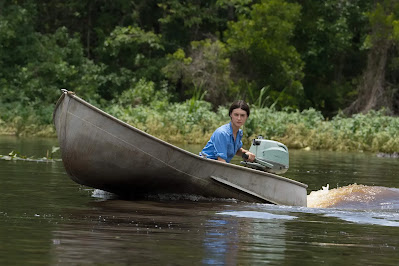Where the Crawdads Sing
Where the Crawdads Sing is gorgeously shot, but the story it tries to tell often comes across as being murky and unfocused. In adapting Delia Owens runaway best seller for the screen, the story comes across as something cliched and riddled with cardboard characters who barely held my attention. The movie is not without its charms, but they are too few for this lifeless adaptation to work. And yet, it all starts so promisingly. We are introduced to young Catherine "Kya" Clark (played by Daisy Edgar-Jones), an outcast in her North Carolina town due to the fact that she lives alone in a shack on the marsh in the outskirts of town. Catherine comes across as an interesting enigma of a heroine, and I looked forward to learning about her. We learn through flashbacks (with the talented Jojo Regina portraying her as a child) she once lived there with her mother and siblings, but they were all chased away by the abuse they suffered at the hands of Catherine's drunken father (Garret Dillahunt, giving a strong performance of anger and sadness). One day, even her father left, so Catherine has lived alone all this time, becoming a bit of a folklore character among the locals as "the Marsh Girl".This is when the movie comes the closest to working, as we watch Catherine learn to survive, and turn her back on the world that sees her as an outsider. There's a kind couple who run the local store (Sterling Macer, Jr. and Michael Hyatt), but that's about all she can turn to early on. Then she meets a nice boy named Tate Walker (Taylor John Smith), who is as bland as he is handsome. A romance blossoms, he teaches her how to write and encourages her to sell some of the private writings that she starts doing. Then he leaves for college and disappears, for reasons that are explained better in the novel than here. That's when she has a chance encounter with another boy, a popular local kid named Chase Andrews (Harris Dickinson), and love seems to be blooming again.However, Chase is a victim to plot convenience. He starts out nice, but then he starts forcing himself upon her, trashing her work and home out of jealousy, and smacking her around. He didn't come across so much as the heavy in a melodrama to me, as a character cast to the winds of the narrative, filling whatever current need may be desired of him by the writer. Sometimes he's patient and understanding, then he's rude, obnoxious, and destructive. It's about this time that Tate comes back to town after years of being away, and there's a hint of a romantic rivalry between the two men that the movie truly fails to explore or act upon. I will have to tread carefully here, as there is a murder of one of the two boys, and Catherine becomes the main suspect. At this point, Where the Crawdads Sing becomes a courtroom drama, with Catherine being paired up with a lawyer straight out of To Kill a Mockingbird, so it's perhaps appropriate that David Strathairn plays the role as if he studied Gregory Peck's performance in that classic film, but picked up none of the subtlety. Strathairn is an immensely talented actor, but the amount of ham he delivers in his performance makes him come across as miscast. It's annoying how the movie will interrupt the narrative seemingly at random with more courtroom theatrics that are built on the same concept that is repeated endlessly; The lawyer representing the state will make some kind of accusation, the courtroom gasps, then Strathairn approaches, makes an opposing view, and the courtroom gasps again. This is trial by formula and cliche.If the courtroom material is stuff that even John Grisham would reject, then the romantic love triangle that is supposed to drive the main story is virtually non-existent. We never get a sense for these two men in Catherine's life, nor how she truly feels about them. We get that she doesn't like it when Chase starts being a jerk, but did she get any hints of that before things turned violent between them? And while we get an explanation as to why Tate disappeared for years, it is not given the amount of weight that it should. Worse still is the film's final moments, when the movie seems to rush through everything that happened after the trial verdict in about two minutes. The answer behind the mystery and Catherine's remaining life are played in fast forward in such a way that it feels like a joke on the audience rather than a satisfying conclusion to everything.And yet, there's things I do want to recommend, starting with the gorgeous cinematography by Polly Morgan. This is an absolutely beautiful film, with the marshes and small town that Catherine calls home seemingly having more life and color than the characters who inhabit these settings. And while the performances here are largely hit or miss, both young women who play Catherine at different points in her life are absolutely wonderful, and got me interested in the character, even if the screenplay by Lucy Alibar (Beasts of the Southern Wild) ultimately betrayed that interest. Given these high quality aspects, you have to wonder what went wrong here. This is a top class production, so why does it feel as off as it does?
My guess is Where the Crawdads Sing is a victim of trying to cram a novel into about two hours, and many of the bigger ideas and character development got left by the wayside, so we are stuck with an adaptation that hits upon the broader notes of the story, but can't focus on the characters like it should. This is a handsome production, but there's nothing to explore underneath.














0 Comments:
Post a Comment
<< Home